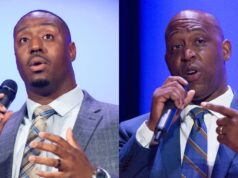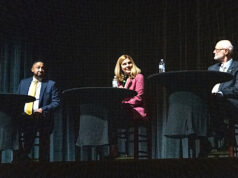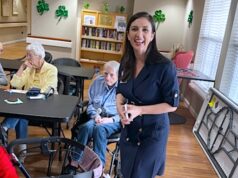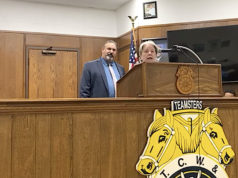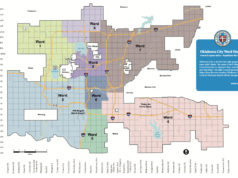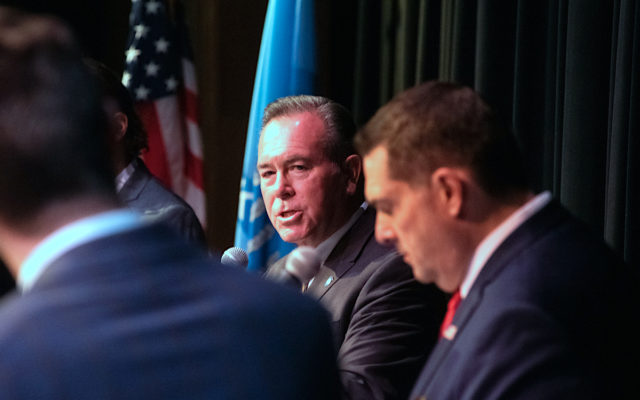

The two remaining candidates seeking the GOP nomination for state treasurer clashed about legislative term limits, support for the state’s oil and gas industry and who most directly addressed teacher pay raises in 2018 during a Tuesday night debate presented by NonDoc and News 9 at the H.B. Atkinson Theater on the campus of Rose State College.
Former Sen. Clark Jolley (R-Edmond) and outgoing Rep. Todd Russ (R-Cordell) squared off in the 60-minute debate ahead of Oklahoma’s Aug. 23 runoff election. In the June Republican primary, Russ finished with 48.51 percent and Jolley received 33.87 percent.
Third-place finisher David Hooten resigned as Oklahoma County Clerk during the primary campaign. Current State Treasurer Randy McDaniel announced in May 2020 that he would not be seeking reelection.
Oklahoma’s state treasurer is selected in a statewide election. The position focuses on providing sound banking and investment services for state funds, and it oversees the state’s Unclaimed Property Program and the 529 College Savings Plan.
According to recent polling by Amber Integrated, the race is a virtual tie. In the survey of 684 likely GOP voters, Russ received 28 percent while Jolley was on his heels with 27 percent. A whopping 46 percent of respondents were undecided.
The winner of the GOP nomination for state treasurer will face Democrat Charles De Coune and Libertarian Gregor J. Sadler in the November general election.
Jolley asked about Ostrowe, Russ asked about his bank
Both candidates were asked about criticisms they have faced during their time in leadership positions.
With Jolley running television advertisements criticizing Russ’s time as CEO of Washita State Bank, moderators asked Russ about a 2009 FDIC inquiry that alleged “unsafe or unsound” banking practices. The discussion of Russ’s banking practices begins around the 51-minute mark of the debate video.
Moderators also asked Jolley about his time as a member of the Oklahoma Tax Commission, specifically the saga that led to the ultimately dropped indictment of former Secretary of Digital Transformation David Ostrowe, who has alleged Open Meeting Act violations by Jolley and other tax commissioners. The discussion of that matter begins at the 44-minute mark of the debate video.
State production tax comes into focus

In one of the most disagreeable portions of the debate, both candidates attempted to paint the other as not being sufficiently supportive of the state’s oil and gas industry.
The exchange centered on past legislation that changed Oklahoma’s gross production tax rates on oil and gas companies. That rate had been temporarily lowered from 7 percent to 1 percent on new horizontally drilled wells for their first four years of production, but that incentive rate was facing expiration in 2015. In 2014, lawmakers — including Jolley — voted to establish a new three-year incentive rate of 2 percent for all new wells, whether they were drilled horizontally or vertically. As state finances sagged over the next three years, a major fight over the budget culminated in a historic revenue agreement passed by legislators — including Russ — that involved raising the gross production tax incentive rate from 2 percent to 5 percent for the first 36 months of production.
Russ simultaneously criticized Jolley for voting to raise the GPT rate from 1 percent to 2 percent — even though it would have gone to 7 percent without HB 2562 — and defended his 2018 vote that raised the rate from 2 percent to 5 percent.
While answering a question about the state penalizing companies that are hostile to the oil and gas industry, Russ said Jolley’s legislative record does not align with his support of a letter signed by 15 state treasurers who have promised to fight “woke capitalism” from doing business with their state governments.
“Sen. Jolley has made comments about he’ll sign the letter on the first day and believes in all the great things that are great Oklahoma values when it comes to oil and gas,” Russ said. “But unfortunately, Sen. Jolley signed a bill and was a part of a bill that ended up having a $132 million impact on the oil and gas industry. So if we’re really going to protect the oil and gas industry, we got to mean that with everything that we mean.”
Jolley defended his 2014 vote and criticized Russ for his votes in 2017 and 2018 when the Legislature was trying to reach the supermajority support required to raise revenue.
“I would point out that the bill that Rep. Russ is mentioning actually was a tax cut to make permanent a 2 percent rate instead of a 7 percent rate, which was a tax cut on the oil and gas industry, while my opponent actually voted several times to double the gross production tax and raise taxes on oil and gas,” Jolley said.
In his response, Russ continued to assail Jolley for his past vote.
“The repeal language in that (bill), Sen. Jolley actually was the author on and voted for, cost the oil and gas industry $132 million,” Russ said. “So, tax, pit fee, penalty, call it what you want, it cost them $132 million. That’s not the kind of friend I’m looking for.”
Candidates bicker about 2018 teacher pay raise
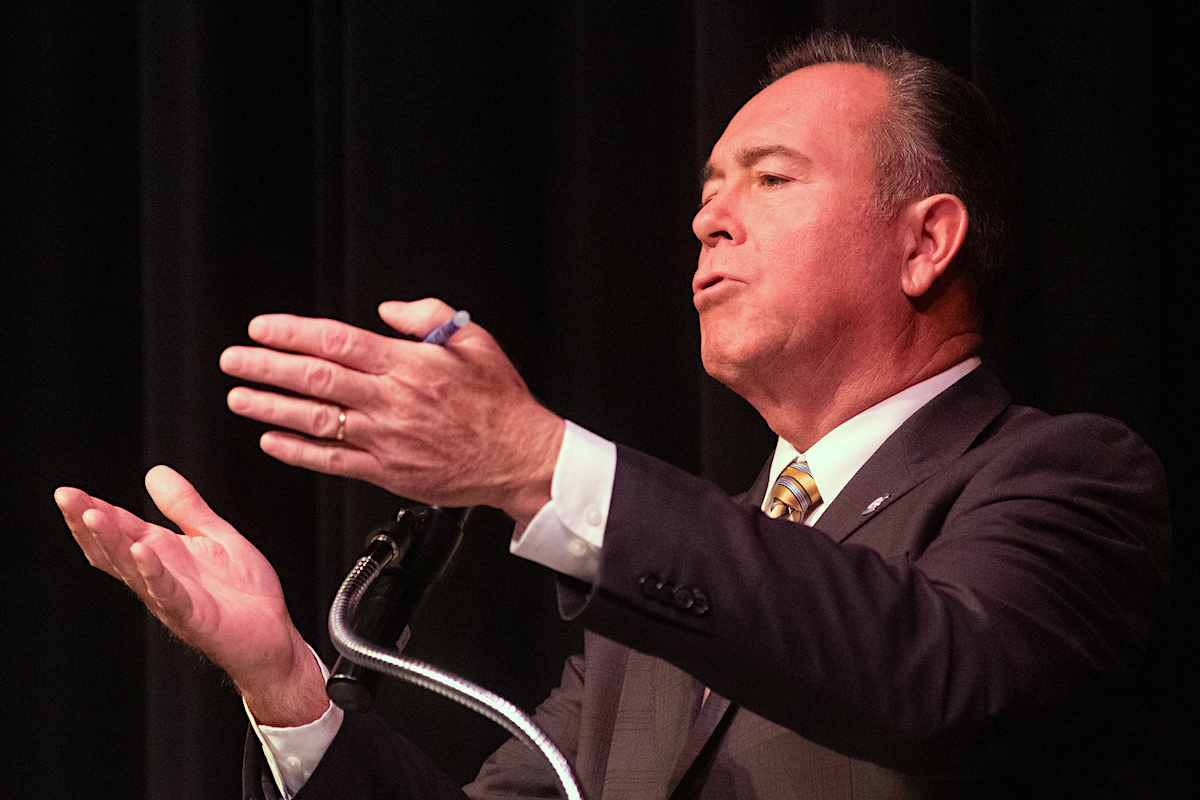
That exchange led into another involving the major teacher pay raise financed by the 2018 revenue bill supported by Russ. As they did regarding gross production taxes, both candidates framed their actions differently and jostled over their support of teacher pay raises.
Early in the exchange, Jolley criticized Russ for voting in favor of the biggest tax increase in state history in 2018: HB 1010XX, which received supermajority support, funded a significant teacher pay raise, added other money into the public education budget and stabilized state finances after years of turmoil. The bill raised fuel taxes, the cigarette tax and the gross production tax incentive rate from 2 to 5 percent.
“The largest tax increase in state history, Rep. Russ as a member of the Legislature voted for that,” Jolley said. “He has voted eight times to increase taxes on Oklahoma families and Oklahoma businesses by the tune of about $2.6 billion. I understand that the budget was in dire times during that time. The budget was in dire times when I was chairman of (Senate) appropriations. We had, my last year, a $1.3 billion shortfall. The year before, $878 million. We balanced those budgets without raising taxes on Oklahoma families and Oklahoma businesses, because that’s the way fiscal conservatives should govern.”
Russ used his response to criticize Jolley for sagging state finances during Jolley’s five years as chairman of the Senate Appropriations and Budget Committee. Russ said Jolley’s inaction on stabilizing state revenues prevented teacher pay raises from occurring sooner. In 2018, thanks to the revenue raised by HB 1010XX, Oklahoma teachers received a $6,000 pay rise. Salaries were raised again in 2019.
“Sen. Jolley had five years to give the teachers a pay raise, and he raided the agencies,” Russ said. “Especially more than anything, he raided the licensure agencies (…). This is their money. That’s not tax money that was derived from taxpayers. They assess themselves their money, and Sen. Jolley raided their accounts and took their money to help with his appropriations — ended up cratering the budget for the state of Oklahoma. And Sen. Jolley’s reign cost us two downgrades on our bond rating with Standard & Poor’s. The idea that we raised taxes to give the teachers a pay raise was some kind of a terrible thing to do, it’s going to be hard for him to answer for down the road.”
Jolley tried to split hairs, saying Russ’s vote on the revenue bill was not to give teacher’s a pay raise but rather to fund what he said was an overgrown state government during an economic downtown. But the teacher pay raises of 2018 and 2019 — as well as the refilling of Oklahoma’s previously depleted savings accounts — would not have been possible without the historic revenue bill the two men were discussing.
“That money wasn’t directed on the tax increase to pay teachers,” Jolley said. “It was directed to fund the state government, and that’s what Rep. Russ voted for. He says that my actions cratered our budget. I inherited a time of economic inactivity in our oil and gas section because, globally, oil and gas prices were cratered. We had a huge drought that devastated our agricultural economy. Oklahoma was facing a creature not of budget, but of circumstance. And I’m proud of what I did during my time as budget chairman. We balanced the budget without raising taxes. It wasn’t a tax increase to fund teachers. It was a tax increase to fund a bloated government.”
Candidates show conditional support for COLA
In a rare moment of agreement, which didn’t come without some criticism of each other, the candidates agreed that retired state employees should receive regular cost of living adjustments from their pensions, otherwise known as COLAs, but only if those increases can be funded with new money so as not to jeopardize the pension plans’ funding ratios.
“We should do the COLA’s, no question,” Jolley said. “But we should not do the COLAs the way that the Democrats did it before we took office and reformed the system. We should make sure that we actually fund the COLAs. Because if you don’t do that, you’re just adding unfunded liabilities to a financial system. Look, those are our largest investments. They also are our largest liabilities, and we’ve got to make sure we’re fiscally prudent and conservative in funding those COLAs.”
Russ said that, during his time in the House, he supported safeguards that would help fund those increases if the Legislature will stick to the plan.
“When I came in, they were funded at about 40-some percent, they were almost at the failing level,” Russ said. “We went in and found a way to reform those. We put in some safeguards and said the actuarials have to say that fund is throwing off enough money to spend it. We’ve got good safeguards in it. If the Legislature will look at those and follow those and not repeal those, we can make that happen.”
Russ again took aim at Jolley’s time as appropriations chairman while he served in the Senate.
“I also think that the Legislature has done some very heavy lifting, in spite of the five-year downturn that we couldn’t put any money into it, when Sen. Jolley was the appropriations chair,” Russ said. “We found ways later to put hundreds of millions of dollars in that to get it up to where we actually gave a COLA for the first time.”
Jolley, Russ disagree on term limits
Neither Russ nor Jolley is eligible to seek additional terms in the Oklahoma Legislature. Under current Oklahoma law, a citizen can be elected to terms totaling a maximum of 12 years in the Legislature, either as a senator or house member or both.
Russ, who is in his final year of legislative service, said he generally supports term limits. But he said he believes those who serve should be given a little more time at the helm of government than they are now.
“I do support term limits, but I will tell you that I think it needs to be changed to 16 or 20 years,” Russ said. “That would match the Senate’s term when you’ve got members of the House who have to run every two years. It’s easy for the Senate to say, ‘No.’ They only run a maximum of three times. I’ve had six campaigns in my tenure. If you could stretch that out to 16 or 20 (years), the House members could actually dig in and get their seniority and go a little bit longer and not have as much turnover.”
Jolley, who represented Edmond for 12 years in the State Senate between 2004 and 2016, said the current term limits are appropriate.
“I absolutely would not support raising the term limit,” Jolley said. “Twelve years is a long time. We have a state of 4 million people. We have a lot of people who are qualified and capable of stepping into roles of leadership and leading with excellence. We don’t need to have the same people making the same decisions. I’m very proud of my service. My 12 years of representing the Edmond area in the Oklahoma State Senate was the honor of a lifetime to represent that area. But 12 years is enough, 12 years is plenty. My predecessor had served right at 16 years, and I think 12 years is exactly where it should be. I don’t support changing it.”
Russ addresses past remarks on Native Americans
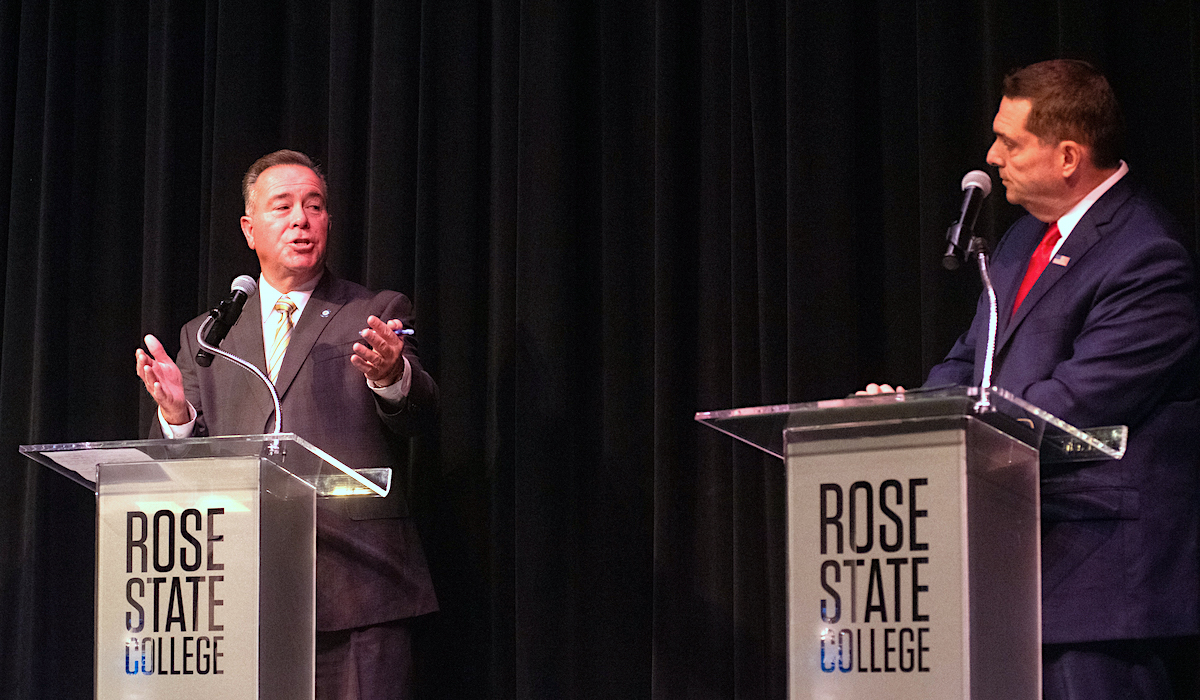
In 2016, while debating against a measure authored by Jolley that ultimately increased access to alcohol in Oklahoma, Russ made a remark about Native Americans that received national criticism. In a floor debate, Russ said Native Americans “cannot process” alcohol “like other people.”
Russ subsequently apologized in 2016, but asked about the situation during Tuesday night’s debate, Russ said his remarks were mostly misconstrued by “out-of-state” groups and those attempting to score political points.
“The people that got upset about that were some out-of-state special interests groups that my opposition sent them bad information on,” Russ said. “The people that heard what I said were very compassionate, very understanding. I was defending the Native Americans, and all of the other — any minorities and Americans that have these genetic dispositions that cause them to have an alcohol problem and these things — I was explaining how it affected my family. It was very much a compassionate, defensive position from them. They just got told bad information. The people that I explained my comments to were very understanding and knew exactly where I was coming from.”
Jolley said it was actually a member of the House who first objected to Russ’s remarks, not outside interest groups.
“Let me just say this: We need to be very responsible with how we present ourselves,” Jolley said. “I think all of us in public office sometimes make statements that we regret and we shouldn’t (make). That being said, the offense was taken immediately on the House floor to that and an objection was made immediately after that statement was made. So I don’t believe it was outside groups that were offended. It was a member of the House who stood up on personal privilege and objected to that characterization.”
Russ said it was actually Democrats who distorted the language he used and tried to create controversy over something he said that was not meant to be offensive.
“The person that stood up on the House floor and complained was the opposition Democrat that sent it out, and tweeted some stuff that wasn’t even factual about the information and got a fire storm going,” Russ said. “So yeah, they immediately took the opportunity to make hay with that and misrepresented the facts and distorted the actual language that I used. The word that went out was that I used the word ‘drunk Indians.’ I never used the word ‘drunk,’ and I never used the word ‘Indians.’ I was highly respectful. These are my friends, my neighbors. People that I’m akin to and I work with and I love. So the representation that I was being insensitive or anything like that was absolutely preposterous if you go back and look at the video.”
Despite Russ pointing to an “opposition Democrat” as the lawmaker who took issue with his remark, it was actually former Rep. Dan Kirby (R-Tulsa) who stood up and said “disparaging Native Americans is an uncalled for, inappropriate comment on the House floor.” (Kirby later resigned following allegations of sexual harassment.)









